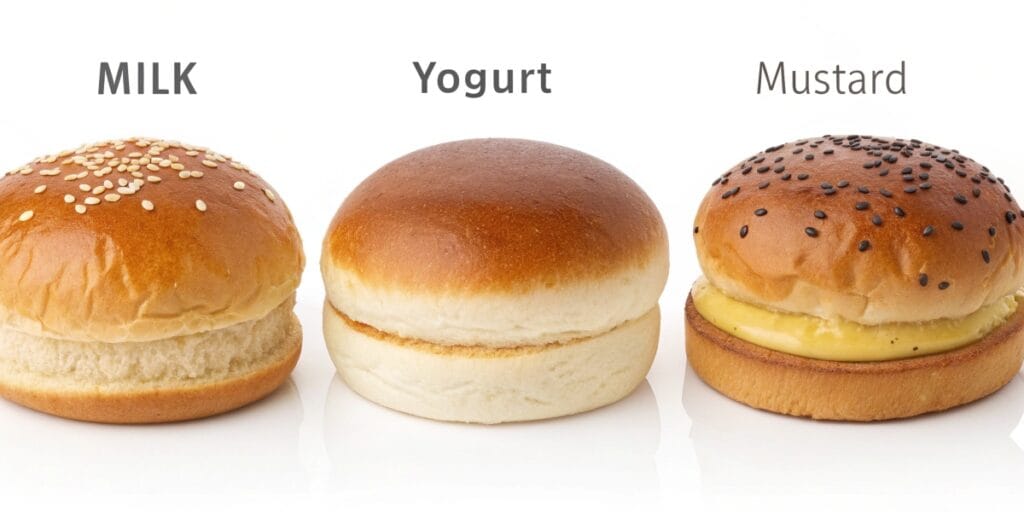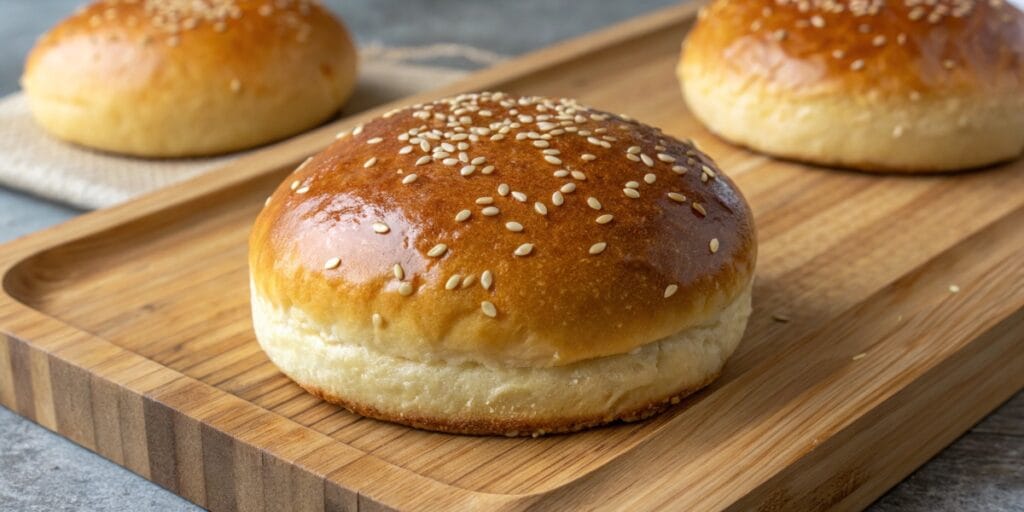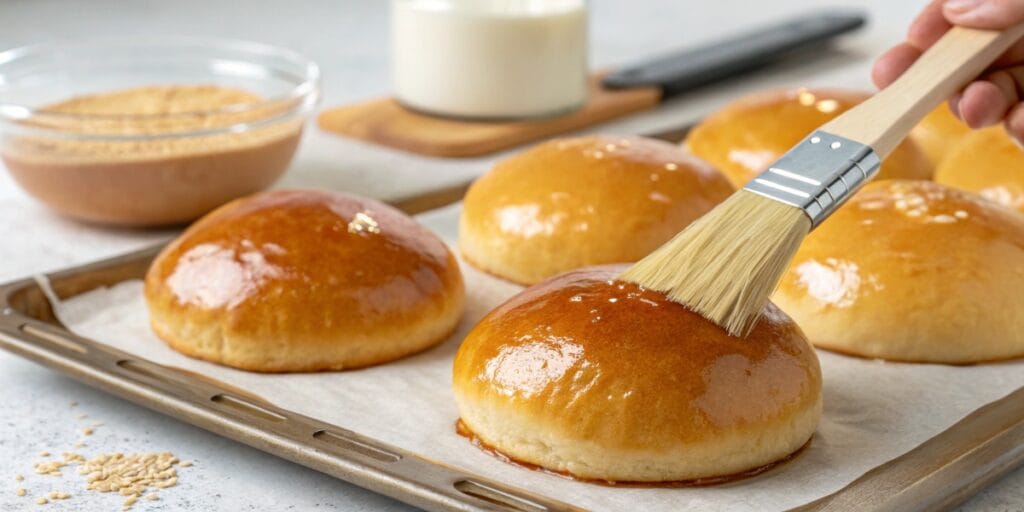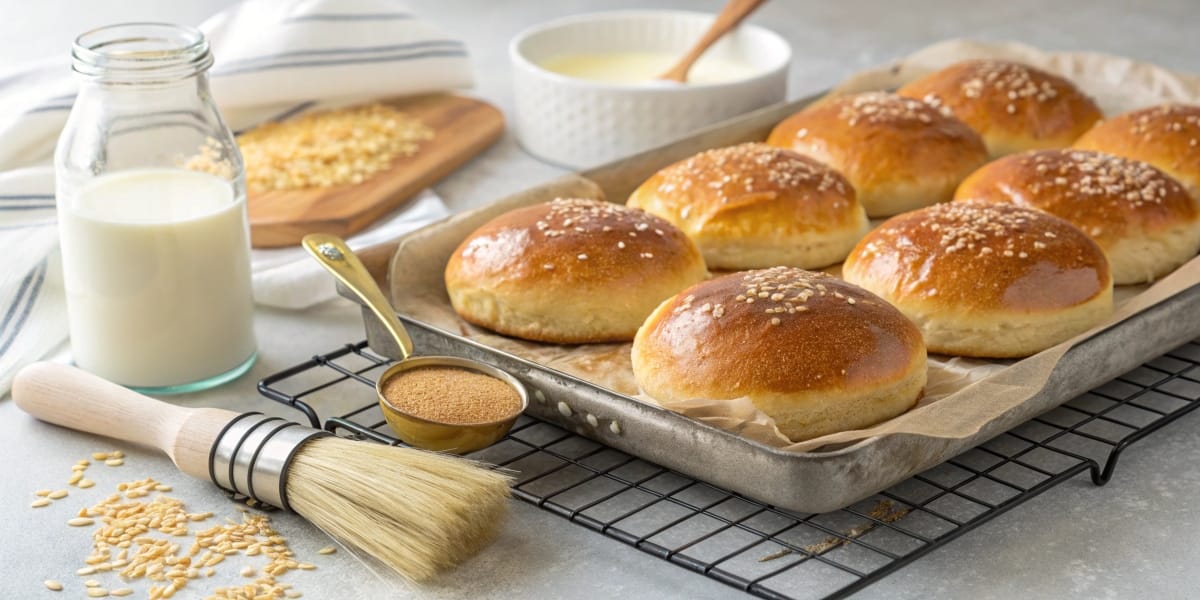Exploring Egg Wash Substitutes for Hamburger Buns: Achieving the Perfect Golden Crust
Creating the perfect hamburger bun often involves using an egg wash to achieve that shiny, golden-brown finish. However, there are many reasons why bakers look for alternatives: egg allergies, dietary preferences, or simply running out of eggs. This article will explore effective substitutes for egg wash that deliver comparable results while maintaining the texture and appeal of your baked goods. Additionally, we’ll provide actionable tips and delve into common questions to ensure you’re confident in your next bake.
Understanding Egg Wash
Egg wash is a combination of beaten eggs and liquid (usually water or milk) applied to baked goods before baking. Its primary purposes include: Egg wash substitutes for hamburger buns
- Adding a glossy or golden finish.
- Enhancing texture and moisture retention.
- Helping toppings like seeds or herbs adhere to the surface.
For instance, if you’re baking breads with toppings, understanding how to create alternative finishes can elevate your recipes. To expand your skills, check out our guide on mastering pastry finishes.
Top Egg Wash Substitutes for Hamburger Buns
Below, we’ve categorized substitutes based on their composition: dairy-based and plant-based alternatives. These options ensure your baking maintains its visual and textural appeal.

1. Dairy-Based Alternatives
If you’re not avoiding dairy, these options work well:
- Milk
- Offers a slightly golden color with a matte finish.
- Works best when a subtle appearance is desired, especially for light, fluffy bread.
- Cream
- Creates a deeper color and richer texture due to higher fat content.
- Ideal for those looking for a luxurious, buttery finish.
- Butter
- Imparts a rich flavor and creates a softer crust.
- Best used sparingly, as it can burn more easily, particularly in high-temperature baking.
To learn more about dairy-free glazes and their application, visit our detailed article on dairy-free pastry glazes.
Additional Dairy Tips: Egg wash substitutes for hamburger buns
When using dairy alternatives, consider the bake time and temperature. Milk-based glazes can caramelize quickly, so keep an eye on your buns to prevent over-browning.
2. Plant-Based Alternatives
Perfect for vegan or egg-free diets, these substitutes ensure inclusivity while preserving quality:
- Oil
- Using vegetable or olive oil can result in a crisp crust, ideal for savory recipes.
- It’s particularly effective when achieving an evenly baked surface without altering flavors too much.
- Non-Dairy Milk
- Options like almond, oat, or soy milk offer a subtle finish and vary in flavor based on the milk used.
- Non-dairy milks also serve as a healthier, lower-fat alternative.
- Aquafaba
- The liquid from canned chickpeas mimics the properties of egg whites remarkably well.
- Provides a glossy finish and is highly recommended for vegan baking. It’s versatile and an excellent solution for replacing eggs entirely in your recipes.
For a comprehensive guide to vegan-friendly baking, check out our tips in baking without eggs: a complete guide.
Syrups and Sweet Finishes
Plant-based syrups, such as agave or maple syrup, can also serve as an egg wash alternative. They add a natural sweetness and create a caramelized finish. However, they’re best suited for sweeter recipes.

Application Techniques
Applying these substitutes correctly ensures the best results, especially when texture and appearance are paramount:
- Tools Needed: A pastry brush, a small bowl, and measuring cups for precision.
- Timing: Apply the substitute just before placing the buns in the oven. This timing is critical to achieving a crisp or glossy crust.
- Method:
- Use even strokes to avoid over-saturating the dough.
- Apply multiple thin layers if needed, particularly for substitutes like aquafaba or oil.
If you’re interested in perfecting your homemade bread recipes, explore our article on homemade vegan hamburger buns for detailed insights.
Advanced Techniques
For more control over the final appearance, try combining substitutes. For instance, mixing non-dairy milk with a bit of oil can enhance both the color and texture of your baked goods.
Flavor and Texture Impacts: Egg wash substitutes for hamburger buns
Each substitute has unique effects on the final product. Understanding these can help you make an informed choice based on your preferences:
- Milk and Cream: Add a subtle richness and mild sweetness, complementing sweeter bun recipes.
- Oil: Produces a crisp texture but may impart a slight oil flavor. Use neutral oils like canola for minimal flavor interference.
- Aquafaba: Replicates the sheen of egg wash without altering flavor significantly. It is ideal for a clean, polished finish without dietary restrictions.
- Syrups: Deliver a caramelized sheen but introduce a sweeter profile, best suited for desserts or sweeter bread recipes.
Frequently Asked Questions (FAQs) about Egg wash substitutes for hamburger buns
1. Can I use mayonnaise as an egg wash substitute?
Yes! Mayonnaise can serve as a substitute, adding a slight tang and promoting browning. It works particularly well for savory baked goods.
2. What is the best vegan substitute for egg wash?
Aquafaba is a top choice due to its similarity to egg whites. It provides a glossy finish while remaining plant-based.
3. Will using milk as a substitute affect the sweetness of the buns?
Milk adds a subtle sweetness due to lactose, complementing most bun recipes. It works best when paired with mildly sweet or savory breads.
4. How does using oil as a substitute impact the crust’s texture?
Oil creates a crispier crust and may slightly affect flavor depending on the type of oil used. For minimal flavor, choose light oils.
5. Are there substitutes that provide a glossy finish similar to egg wash?
Both aquafaba and syrups like maple or agave can offer a sheen while adding a hint of sweetness. Experiment with these for variations in finish and flavor.
Beyond Hamburger Buns: Expanding Egg Wash Alternatives
Egg wash substitutes are not limited to hamburger buns. Here are some additional applications where these alternatives can shine:
- Pastries and Croissants: Achieve a golden finish using plant-based options like aquafaba.
- Pie Crusts: Use syrups for a sweet glaze or oil for a savory shine.
- Soft Pretzels: Try brushing with non-dairy milk for a smooth, lightly browned appearance.
These alternatives are versatile and can be tailored to suit a wide range of baking needs.

Conclusion
Whether you’re avoiding eggs for dietary reasons or simply experimenting, there are plenty of substitutes that can help you achieve beautifully finished hamburger buns. From dairy-based options like milk and cream to vegan-friendly alternatives like aquafaba, the possibilities are endless. Moreover, these substitutes ensure inclusivity without compromising quality, making them versatile for diverse preferences.
Incorporating these alternatives is not only practical but also a creative way to enhance your baking repertoire. To explore more techniques for egg-free baking, visit our comprehensive guide on vegan baking essentials.
For further learning, this resource on baking without eggs provides more depth on advanced techniques. Additionally, check out this article for an expanded look at glaze alternatives across various recipes.
By embracing these substitutes, you can confidently bake with creativity and care, knowing you’ve made thoughtful choices tailored to your needs.


1 thought on “Egg wash substitutes for hamburger buns”